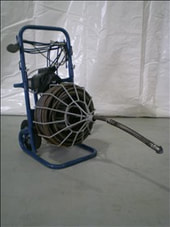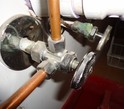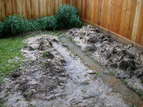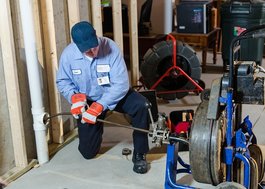
Do you need a Plumber?
CALL us now at (908) 988-0365 for any job, large or small. We will do everything from a small toilet replacement to a new sewer system. Call us today. No job too big or too small. We can do an entire rough-in for new construction, or we can fix a burst pipe. But, the sooner you call, the sooner we can can get to your location to solve your problem and prevent it from getting worse. Don't wait. If you are looking for "the best plumber near me" you have found them. It's us. Plumbers and also clogged drain specialists. Usually when you call for help with a blocked main sewer line or a clogged drain, you usually just call a plumber or a drain-clearing franchise. Generally, good plumbers are pretty good at handling a drain problem. Remember, problem drains and stopped up sewer lines are best handled by someone who has enough experience to have seen it all. Meanwhile, the large franchises generally don’t provide the personal service that a locally-owned business can. At Elizabeth Plumbers and Drain Service we have seen it all, from every angle and every situation because we do it, every day. Drains and sewer lines are one of our specialties, and we take them very seriously because little problems can become big problems. And whatever you do, be careful not to call a "do-it-all" handyman. You don't know what you are getting and they can often cause more problems than they solve when it comes to a drain blockage. Each member of our team enjoy what they do so expect to receive the best plumbing service there is. Make sure your plumber has the right tools, the right experience, and the right ATTITUDE. |
If you don't like to read long narratives about plumbers, here's the quick rundown of some of the stuff we do:
Fix faucets, and faucet replacement Repair or replace a toilet Replace a bathroom vanity, or just a bathroom sink Install new supply lines, or replace old brass lines and fittings Replace your hot water heater Repair or replace your boiler Fix pipe leaks And, of course, we are full service DRAIN specialist - for clogged drains, backed up sewers, french drains and excavations! Call us for a free consultation - we don't bite! |
The drain clearing process.
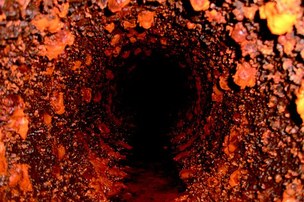
After you call us, we will schedule an appointment for your repair. If it is an emergency we are usually available to come the same day, and we take calls 24/7 because we know that a blocked main line can rapidly escalate into a very unpleasant situation, particularly in a multi-family house where you are counting on collecting your rents. When your waste lines stop working, so does your ability to use the fresh incoming water that we all use to bathe, cook, and take care of our families.
We will come and scope out your problem, using the latest tools. We have drain cameras that we can use, when necessary, to see what’s happening inside your pipes, no matter how deep the problem is. This removes all the guesswork and allows us to diagnose your problem fast, and will allow us to deploy the correct solution to get your problem solved and quickly and efficiently as possible. We can estimate the cost of your job with greater accuracy, so there are fewer surprises.
Here's why you should call us, and not someone else.
|
At Elizabeth Plumbers and Drain Service, you will see the difference right away. Our business is family-run and not an impersonal giant franchise following a stiff and unforgiving “business model”. Our employees are courteous and are well aware of the stress associated with a serious backed up sewer line. We are sensitive not only to our customers’ problems, but also to the effect the problem has on their frame of mind.
We want to turn any issue, whether a simple stopped-up kitchen drain or significant main line backup into an efficiently delivered solution, so that you can get back to your life without delay. We hope and expect that you will be happy to see us when we come to your door, but we want you to be even happier when we leave. You will be treated courteously, everything will be explained carefully, and the problem will have been solved. |
Drain problems can be a simple as a hairball causing blockage in a drain line in an upstairs bathroom, or it can be something as bad as a collapsed main line leaving your house as it heads to the sewer main in the street. Tree root damage or old rotting pipes can all be culprits. That’s why we have sophisticated cameras when we need them. Sometimes a drain problem can be solved in ten minutes with a simple and small snake and sometimes it will take heavy equipment to find a blocked main under the front of your house. We have extensive experience with all these issues, and no matter how big the job is, we can get it done quickly, efficiently, and for a fair price. If our service isn’t good enough for you to happily and enthusiastically tell your friends about, then we have not done our job.
|
Full Service Plumbers, Expert Drain Specialists
And if you need waste pipes or water (supply) lines replaced, we are equipped to handle all aspects of your plumbing needs, from replacing old rotted waste lines or main lines and supply lines anywhere in your house with PVC and PEX lines. We can run lines for a new bathroom in an attic or basement. We can help you resolve all other types of small issues around your house or rental property, from a leaky toilet tank system (that is using more water than it should) or replacing a leaky faucet or shower body. A tiny leak can cost you hundreds over the course of a year!
And if you need waste pipes or water (supply) lines replaced, we are equipped to handle all aspects of your plumbing needs, from replacing old rotted waste lines or main lines and supply lines anywhere in your house with PVC and PEX lines. We can run lines for a new bathroom in an attic or basement. We can help you resolve all other types of small issues around your house or rental property, from a leaky toilet tank system (that is using more water than it should) or replacing a leaky faucet or shower body. A tiny leak can cost you hundreds over the course of a year!
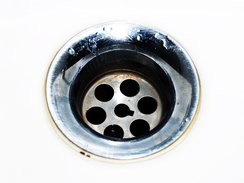
Call us. We are here to help!
Please call us today if you have any questions about any of our services, or have an emergency. We are happy to discuss on the phone with you any problems that you have with your household plumbing and offer any advice we can, before we actually come to your location. If five minutes of free advice is all you need, we are happy to help. Our goal is to be there for you, promptly and courteously when something arises that requires a professional’s careful touch. Building strong relationships is a key part of our business.
Please call us today if you have any questions about any of our services, or have an emergency. We are happy to discuss on the phone with you any problems that you have with your household plumbing and offer any advice we can, before we actually come to your location. If five minutes of free advice is all you need, we are happy to help. Our goal is to be there for you, promptly and courteously when something arises that requires a professional’s careful touch. Building strong relationships is a key part of our business.
Preventative Maintenance for your Sewer Lines and Drains
|
When we visit your location - whether we have solved a small simple problem for you, or a very big headache-inducing sewer main line problem - we will work with you to create a regimen of preventative steps you can take to keep your waste lines flowing smoothly. There are a number simple things a homeowner or a landlord can do (with instructions for tenants) that will keep blocked drains from reappearing. We will help you manage your plumbing to keep it all as healthy and as maintenance-free as possible. It doesn't take much daily care to keep your problems at bay! Call us and we can get you started with 5 tips you can use right away to help keep your drains clear. We promise it will be worth it!
|
If you need a plumber that will get the job done right the first time, CALL US!
We serve Elizabeth, New Jersey and the surrounding areas: Jersey City, Bayonne, Newark, Hoboken, Kearny, Union City, Weehawken, West New York, Edgewater, Guttenberg and North Bergen. Call us today if you want a reasonably priced plumber that's near you, and reliable! We will go anywhere in Hudson County, Bergen County, or Essex County. Call us today and experience the "best plumber near me" which ironically is the best way to find us on a Google search!


